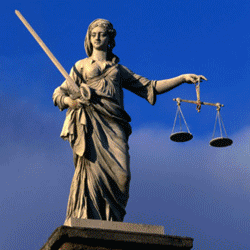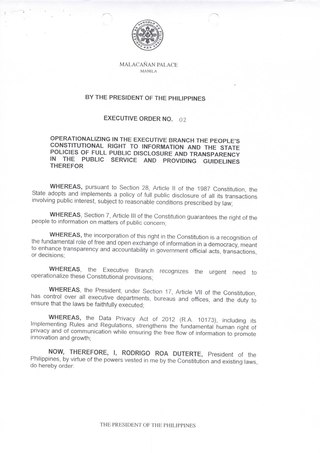
The United States Department of Justice (DOJ), also known as the Justice Department, is a federal executive department of the United States government tasked with the enforcement of federal law and administration of justice in the United States. It is equivalent to the justice or interior ministries of other countries. The department is headed by the U.S. attorney general, who reports directly to the president of the United States and is a member of the president's Cabinet. The current attorney general is Merrick Garland, who was sworn in on March 11, 2021.
In most common law jurisdictions, the attorney general or attorney-general is the main legal advisor to the government. In some jurisdictions, attorneys general also have executive responsibility for law enforcement, prosecutions or even responsibility for legal affairs generally. In practice, the extent to which the attorney general personally provides legal advice to the government varies between jurisdictions, and even between individual office-holders within the same jurisdiction, often depending on the level and nature of the office-holder's prior legal experience.
A solicitor is a legal practitioner who traditionally deals with most of the legal matters in some jurisdictions. A person must have legally-defined qualifications, which vary from one jurisdiction to another, to be described as a solicitor and enabled to practise there as such. For example, in England and Wales a solicitor is admitted to practise under the provisions of the Solicitors Act 1974. With some exceptions, practising solicitors must possess a practising certificate. There are many more solicitors than barristers in England; they undertake the general aspects of giving legal advice and conducting legal proceedings.

A prosecutor is a legal representative of the prosecution in states with either the common law adversarial system or the civil law inquisitorial system. The prosecution is the legal party responsible for presenting the case in a criminal trial against the defendant, an individual accused of breaking the law. Typically, the prosecutor represents the state or the government in the case brought against the accused person.

The Law Officers are the senior legal advisors to His Majesty's Government and devolved executives of the United Kingdom. They are variously referred to as the Attorney General, Solicitor General or Advocate General depending on seniority and geography - though other terms are also in use, such as the Counsel General for Wales. Law Officers in these roles are distinguished by being political appointees, while also being bound by the duties of independence, justice and confidentiality among the other typical professional commitments of lawyers. These roles do not have any direct oversight of prosecutions nor do they directly lead or influence criminal investigations. This is a distinguishing factor between Law Officers and the State Attorneys General of the United States or US Attorney General.

The Solicitor General of India (SGI) is subordinate to the Attorney General for India. The SGI is the second-highest law officer of the country, assists the Attorney General, and is assisted by Additional Solicitor Generals of India (Addl. SGIs). The SGI and the Addl. SGIs advise the Government and appear on behalf of the Union of India in terms of the Law Officers (Conditions of Service) Rules, 1972. However, unlike the post of Attorney General for India, which is a Constitutional post under Article 76 of the Constitution of India, the posts of the Solicitor General and the Additional Solicitors General are merely statutory.

The Supreme Court (Filipino: Kataas-taasang Hukuman; colloquially referred to as the Korte Suprema is the highest court in the Philippines. The Supreme Court was established by the Second Philippine Commission on June 11, 1901 through the enactment of its Act No. 136, an Act which abolished the Real Audiencia de Manila, the predecessor of the Supreme Court.

An advocate general of a state is a senior officer of the law. In some common law and hybrid jurisdictions the officer performs the function of a legal advisor to the government, analogous to attorneys general in other common law and hybrid jurisdictions. By contrast, in the European Union and some continental European jurisdictions, the officer is a neutral legal advisor to the courts.

The Department of Justice is under the executive department of the Philippine government responsible for upholding the rule of law in the Philippines. It is the government's principal law agency, serving as its legal counsel and prosecution arm. It has its headquarters at the DOJ Building in Padre Faura Street, Ermita, Manila.

The Sandiganbayan is a special appellate collegial court in the Philippines that has jurisdiction over criminal and civil cases involving graft and corrupt practices and other offenses committed by public officers and employees, including those in government-owned and controlled corporations. The special court was established by Presidential Decree No. 1486. It was subsequently modified by Presidential Decree No. 1606 and by Republic Acts 7975, 8249 and 10660. It is equal in rank to the Court of Appeals, and consists of fourteen Associate Justices and one Presiding Justice. The Office of the Ombudsman owns exclusive authority to bring cases to the Sandiganbayan.

The judicial officers of the Republic of Singapore work in the Supreme Court and the State Courts to hear and determine disputes between litigants in civil cases and, in criminal matters, to determine the liability of accused persons and their sentences if they are convicted.

Agnes Vicenta Salayo Torres-Devanadera, also known as Agnes VST Devanadera, is a Filipina lawyer and politician who is currently the president and CEO of Clark Development Corporation since her appointment by Bongbong Marcos in 2022. She previously served as the chairperson of the Energy Regulatory Commission (ERC) from 2017 to 2022 during the Duterte administration. During the Arroyo administration, she served as the Solicitor General of the Philippines, the first woman to hold the post. She was also the acting Secretary of Justice on two short stints.
The New York City Law Department, also known as the Office of the Corporation Counsel, is the department of the government of New York City responsible for most of the city's legal affairs. The department is headed by the Corporation Counsel, currently Sylvia Hinds-Radix, the 81st official to hold this position.

The Attorney General's Department is a non-ministerial government department in Sri Lanka that supports the attorney general and his/her deputy the solicitor general. The department is headed by the attorney general and comes under the purview of the Ministry of Justice. The office of "Attorney General" was formally adopted in the year 1884.

Roberto A. Abad is a lawyer and judge who served as an associate justice of the Supreme Court of the Philippines from August 7, 2009, to May 22, 2014.
Pedro Tiangco Tuason was a prominent Filipino lawyer and government official. Born in Balanga, Bataan on 15 September 1884 to Clemente Tuason and Josefa Tiangco, Tuason attended the public school in his town and at an escuela de segunda ensenanza. He was sent to study in the United States as a government pensionado, attending the New Jersey State Normal School in Trenton, then the Georgetown University Law School in Washington, D.C., where he graduated with the Bachelor of Laws degree in 1908, and finally the Yale Law School where he took a post graduate course. His name is sometimes wrongly spelled with the letter "z", such as the small stretch of a street named after him, but court decisions commonly use his original birth spelling.

The Office of the Attorney General (OAG) is an agency of the Oklahoma state government that is headed by the Attorney General of Oklahoma. The OAG is responsible for supervising the administration of justice across the State, providing legal assistance to the State government, and prosecuting violators of State law.

The National Judicial Appointments Commission (NJAC) was a proposed body which would have been responsible for the recruitment, appointment and transfer of judicial officers, legal officers and legal employees under the government of India and in all state governments of India. The commission was established by amending the Constitution of India through the 99th constitution amendment with the Constitution (Ninety-Ninth Amendment) Act, 2014 or 99th Constitutional Amendment Act-2014 passed by the Lok Sabha on 13 August 2014 and by the Rajya Sabha on 14 August 2014. The NJAC would have replaced the collegium system for the appointment of judges as invoked by the Supreme court via judicial fiat by a new system. Along with the Constitution Amendment Act, the National Judicial Appointments Commission Act, 2014, was also passed by the Parliament of India to regulate the functions of the National Judicial Appointments Commission. The NJAC Bill and the Constitutional Amendment Bill, was ratified by 16 of the state legislatures in India, and subsequently assented by the President of India Pranab Mukherjee on 31 December 2014. The NJAC Act and the Constitutional Amendment Act came into force from 13 April 2015.

Solicitor General for New South Wales, known informally as the Solicitor General, is one of the Law Officers of the Crown, and the deputy of the Attorney General. They can exercise the powers of the Attorney General in the Attorney General's absence. The Solicitor General acts alongside the Crown Advocate, and Crown Solicitor, and serves as one of the legal and constitutional advisers of the Crown and its government in the Australian state of New South Wales.

Philippine President Rodrigo Duterte signed Executive Order No. 02, also known as the Freedom of Information (FOI) Program, on July 23, 2016, in Davao City. The executive order established the first freedom of information (FOI) Program in the Philippines covering all government offices under the Executive Branch. It requires all executive departments, agencies, bureaus, and offices to disclose public records, contracts, transactions, and any information requested by a member of the public, except for matters affecting national security and other information that falls under the inventory of exceptions issued by Executive Secretary Salvador Medialdea. The landmark order was signed two days before Duterte delivered his first State of the Nation Address and just three weeks after he assumed the presidency on June 30, 2016.
















